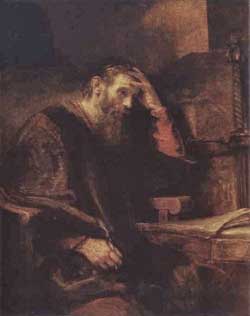
The Dating Game: Acts of the Apostles
Posted by Mike Koke in Gospel of Luke/Acts
Scholars have assigned a date for Luke-Acts as early as 60 CE and as late as 150 CE. This should immediately alert us to the fact that dating a text is more of an art and definitely not an exact science. I want to go over the various external and internal evidence that scholars must weigh in attempting to date the book of Acts.
The earliest external evidence: The earliest extant manuscript is p75 which includes the title euangelion kata loukan and the Muratorian canon assigns the work to Luke the Physician and companion of Paul (see also anti-Marcionite prologues). Our earliest external attestation for the authorship of Luke as companion of Paul appears in Irenaeus (Adv. Haer. 3.1.1; 3.14.1), which also sets a terminus ad quem for the work (cf. also possibility Justin Martyr knows Luke-Acts in 1 Apol. 50:12).
Do the “we passages” in Acts reflect the perspective of a first-hand witness and companion of Paul on his travels, reveal the authorʼs use of earlier sources or utilize a conventional narrative device? Along the same lines, does the narrative in scenes such as the final sea voyage reflect a sense of “immediacy” as well as the historical verisimilitude in details throughout Acts demonstrate an eyewitness account?
The absence of any mention of Paulʼs martyrdom or the destruction of the Temple in 70 CE as a past event may suggest an early date before these events occurred. On the other hand, the author makes explicit references to the destruction of Jerusalem and the Temple (Luke 19:43-44; 21: 20-24 – note especially how Luke historicizes Markʼs obscure “abomination of desolation” as Roman armies surrounding Jerusalem) and the main purpose of Acts is the extension of the Gospel from Judaea, Samaria, to the ends of the earth (Acts 1:8) and thus concludes with Paul in the capital of the Roman Empire (Acts 28:16-31).
In Acts, Christians are always found generally innocent before Roman courts. For instance, the proconsul Galio dismisses the charges against Paul as merely an internal dispute over matters concerning the Jewish Law (Acts 18:12-17). Does this mean that Acts had to be written before official state suppression as reflected in the correspondence between Pliny and Trajan in 112 ca (ep. 10.96-97) or does Acts presentation reflect an apologetic directed to the Roman authorities that Christians are not a political threat or an internal means to legitimate the Christian community in the context of the Roman Empire?
Does the author of Acts know or use Paulʼs letters? On the one hand, many of Paulʼs major emphases seem to be absent and Acts generally restricts the title of “apostle” to the Twelve. One would not even know that Paul wrote letters if all we had to go by was Acts! On the other hand, compare the similarities and differences between the accounts of the “Jerusalem Council” in Gal 2 and Acts 15 or the one mention of “justification” which correctly appears on the lips of Paul (Acts 13:39).
Does the author of Acts know or use Josephus Antiquities (e.g., Acts 5:35-39 & Ant. 18.1-10, 23; 20.97-102; Acts 21:37 & Ant. 20.169-172)? While there seems to be serious chronological differences between Acts and Josephus in regards to Judas the Galilean and Theudas (see my post here), Josephus does narrate his account of Theudas and Judas in reverse order (possibly influencing the order in Gamalielʼs speech in Acts).
Does Luke-Acts reflect growing concerns among proto-orthodox (or “centrist”) Christians in the second century for a single Christian church governed by a hierarchical order of bishops and supported by the idea of apostolic succession? Acts presents the history of the church as a story of pristine origins in Jerusalem governed by the twelve apostles (with Peter as the figurehead) and with a trajectory leading to Rome. Paul also establishes overseers (episkopos) to guard the flock from false teachers in the church in Ephesus (Acts 2o:28).
In Acts, Peter initiates the Gentile mission in the conversion of Cornelius and defends the Law-free mission to Gentiles in Acts 15. Meanwhile, Paul proudly identifies as a Pharisee (Acts 23:6), educated by the esteemed Gamaliel and zealous for Torah (Acts 22:3), and remains observant in spite of contrary reports (Acts 21:17-26). His fidelity to Torah is displayed when he circumcises Timothy (Acts 16:3) or when he agrees to help some men undertake a purification ritual (Acts 21:26). Does Acts reflect a mixed Christ community of Jewish and Gentile God-fearers (the major converts in Acts) or is this a later “centrist” attempt to reconcile divergent wings of “Christianity”? Is it possible that the emphasis on Paulʼs Jewish piety and parallelism with Peter is a response to an early Marcionite challenge?
In conclusion, one could theoretically interpret these lines of evidence as supporting an early, intermediate or late date for the book of Acts. So on the basis of these arguments, where would you date the Acts of the Apostles? A sample of works to consult:
Esler, Philip. Community and Gospel in Luke-Acts: The Social and Political Motivations of Lucan Theology. Cambridge and New York: Cambridge University Press, 1987.
Harnack, Adolf. The Date of Acts and of the Synoptic Gospels. New York: Putman, 1911.
Hemer, Colin. The book of Acts in the Setting of Hellenistic History. Tubingen: Mohr Siebeck, 1989.
Malina, Bruce J. and Pilch, John J. Social-Science Commentary on the Book of Acts. Minneapolis: Fortress Press, 2008
Pervo, Richard. Dating Acts: Between the Evangelists and the Apologists. Santa Rosa: Polebridge, 2006.
Robbins, V. K. “The We Passages in Acts and Ancient Sea Voyages”, Biblical Research 20 (1975): 5-18.
Robinson, John A.T. Redating the New Testament. Wipf & Stock, 1976.
Tyson, Joseph B. Marcion and Luke-Acts: A Defining Struggle. Columbia: University of South Carolina Press, 2006.
Witherington III, Ben. The Acts of the Apostles: A Socio-Rhetorical Commentary. Grand Rapids: Eerdmans, 1998.
Do the Pastorals reflect Paulʼs concerns near the end of his life to establish qualified leadership in his churches that would faithfully pass on received traditions, or do they reflect a secondary stage of development in proto-orthodox circles in the second century in the concern for a hierarchical church structure supported by apostolic succession as a way to safeguard ”orthodoxy” (cf. 1 Clement, Ignatius, etc.)? Does Luke-Acts reflect the views of a close companion of the apostle Paul (based on patristic tradition and the “we” speeches in Acts) and written as early as 60s CE, or could it be written as late as the early-to-mid Second Century in a proto-orthodox attempt to narrate church history as a story of pure apostolic origins and singular trajectory from Jerusalem to Rome. I would note a sample of excellent posts in the past by April DeConick, Mark Goodacre or James Crossley which lay out how they date the crucial texts and how it influences models of Christian origins.
Dating the crucial sources in early Christianity Mark Goodacre, Religion Department, Duke University Society of Biblical Literature Annual Meeting, Boston, November 21-24 2008 [Latest draft, 27 May 2009]
Reviews Of Books On Acts Published Online By The Society Of Biblical Literature
The Conclusion of Luke–Acts: The Significance of Acts 28:16–31 Puskas, Charles Eugene, Ore.: Pickwick Publications, 2009
The “We” Passages in the Acts of the Apostles: The Narrator as Narrative Character Campbell, William Sanger Society of Biblical Literature/Brill, 2007
The Assumed Authorial Unity of Luke and Acts: A Reassessment of the Evidence Walters, Patricia Cambridge University Press, 2009
On the Road Encounters in Luke-Acts: Hellenistic Mimesis and Lukeʼs Theology of the Way Baban, Octavian D. Paternoster, 2006
Suggested Reading On The Acts Of The Apostles (From A Reading List Compiled By Dr. Robert M. Price)
*Edward Zeller, The Contents And Origin Of The Acts Of The Apostles - Vol I. A classic of Tübingen criticism! As good as F.C. Baur if not better!
*Ernst Haenchen, Acts of the Apostles: A Commentary. Worthy of Baur and Zeller—great stuff!
Hans Conzelmann, Acts of the Apostles: A Commentary on the Acts of the Apostles (Hermeneia: a Critical and Historical Commentary on the Bible). Info-packed, comprehensive. Read it with Haenchen as I did in grad school.
Kirsopp and Lake, The Beginnings of Christianity: The Acts of the Apostles : Vol.1 (4 vols., though this link is for the first volume. All volumes are recommended.) A feast of informative articles.
*Henry Cadbury, The making of Luke-Acts. Wow! What didnʼt this guy know about Luke-Acts and its intricacies!
Leander E. Keck and Louis Martyn, eds., Studies in Luke-Acts Many important articles, including Vielhauerʼs “On the ‘Paulinism’ of Acts,” where he shows the author of Acts cannot have known Paul.
Gerhard Lohfink, The Conversion of St. Paul: Narrative and History in Acts Great study of one tradition complex.
J.C. OʼNeill, The Theology of Acts in its Historical Setting, Virtually proves Acts was written in the 2nd century.
Martin Dibelius, Studies in the Acts of the Apostles Historic study made absolutely clear the literary (not historical) character of both narratives and speeches of Acts.
Jack T. Sanders, The Jews in Luke-Acts Shows Luke was pretty darn anti-Semitic.
Gerd Lüdemann, Early Christianity According to the Traditions in Acts: A Commentary Interesting treatment, examining each episode in Acts and trying to boil it down to a possible historical core.
Richard I. Pervo, Profit With Delight: The Literary Genre of the Acts of the Apostles. Shows the kinship of Acts with both the ancient novels and the Apocryphal Acts of the Apostles.
*Richard I. Pervo, Dating Acts: Between the Evangelists and the Apologists. Acts was written in the 2nd century—case closed. Pervo is like Michael Ciscoʼs The Divinity Student—with texts for innards!
Charles H. Talbert, ed., Perspectives on Luke-Acts (Perspectives in Religious Studies : Special Studies Series, No. 5) A number of illuminating studies. Did Luke write the Pastorals? Do the “we” passages of Acts imitate ancient sea-voyage narratives?
*Joseph B. Tyson, Marcion and Luke-acts: A Defining Struggle. Acts as a response to Marcion. (Peter represents not “Jewish Christianity” which wanted to keep the Torah, as Baur supposed, but Catholicism which didnʼt want to follow Marcion in cutting loose the OT!)
*Ferdinand Christian Baur, Paul, the Apostle of Jesus Christ: His Life and Works. His famous treatment of Epistles versus Acts, Peter (Torah-Christianity) vs. Paul (Gentile Christianity), Paulʼs authorship only of the Hauptbriefe (Romans, Galatians, Corinthians), etc. Not based on Hegelianism, despite what ad hominem apologists always bark.
Dennis R. MacDonald, Does the New Testament Imitate Homer?: Four Cases from the Acts of the Apostles. A big yes.
Eric Franklin, Christ the Lord: A Study in the Purpose and Theology of Luke-Acts. Argues that Luke wrote, accentuating the Ascension as the dawn of a special intermediate period of hidden glory to encourage suffering Christians in the wake of the delay of the Parousia.
Charles H. Talbert, Luke and the Gnostics;: An Examination of Lucan Purpose. Shows how Luke-Acts has an agenda precisely like that of the 2nd-century apologists: anti-Gnostic, anti-docetic. Pagels and James M. Robinson will have more to say.
David L. Tiede, Prophecy and History in Luke-Acts
[The construction of the above list of resources was inspired by questions raised by my friend, Christian philosopher Victor Reppert at his blog Dangerous Idea, who seems to be arguing that William Ramsayʼs study of the world of the author of the Book of Acts constitutes a form of positive evidence concerning the supernatural truth of the story of Christian origins, when at most itʼs evidence of historical matters that could have been less correctly related, and not proof of positive evidence. To say a work meets historical requirements is not to say such a work constitutes proof of the supernatural stories it contains, nor of the truth of the theology and creeds that developed out of it.]


